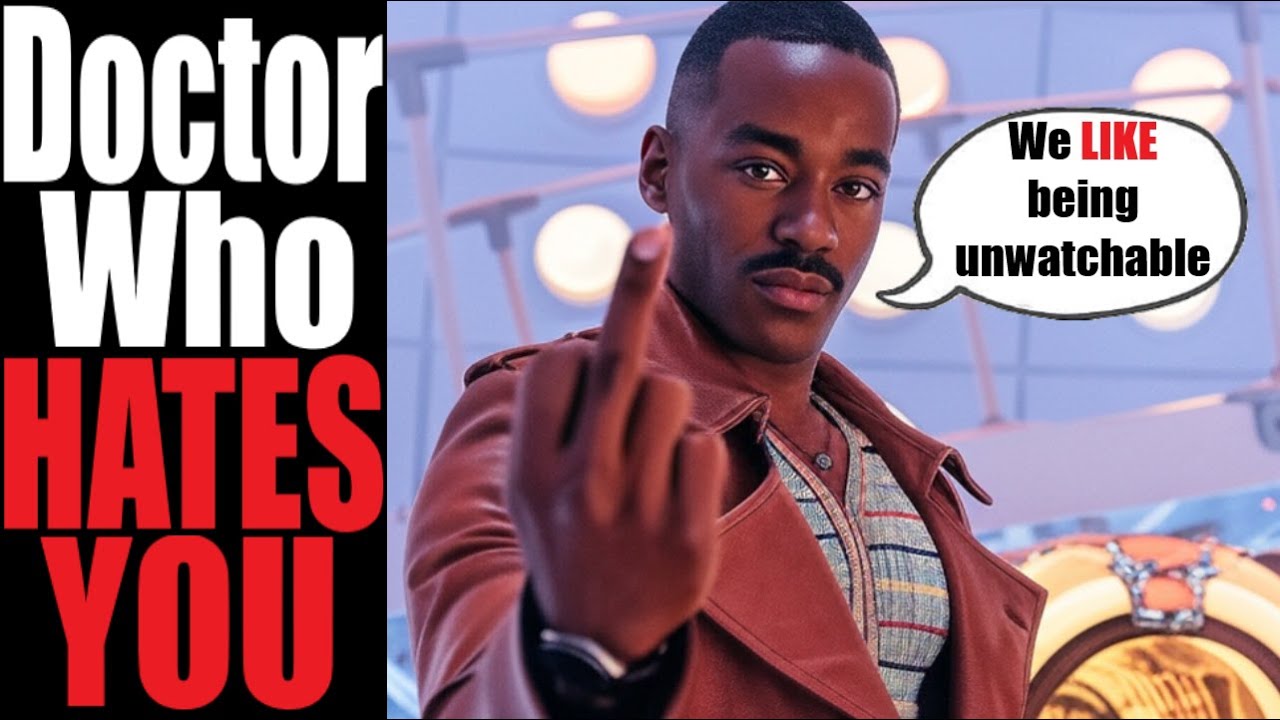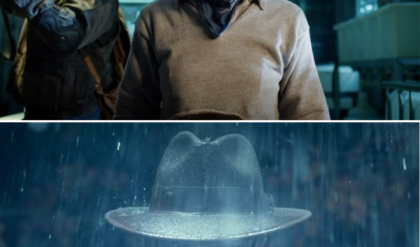Doctor Who’s Ratings Crisis: Is ‘Woke’ Storytelling to Blame for Its Decline?
Doctor Who, the BBC’s flagship sci-fi series, has long been a cultural touchstone, captivating audiences with its time-traveling adventures since 1963. However, recent claims have thrust the show into controversy, with some asserting that the BBC has admitted its viewership is “awful” due to “woke” and “unwatchable” storylines. The departure of Ncuti Gatwa as the Fifteenth Doctor in the Series 15 finale on June 1, 2025, and a reported ratings decline have fueled speculation that the show’s progressive themes—featuring diverse casts and social commentary—are alienating its audience. As fans on platforms like X debate whether Doctor Who has lost its way, what’s really behind the ratings drop, and has the BBC truly conceded defeat?

The Claim: A “Woke” Doctor Who in Crisis
The narrative that Doctor Who is suffering due to “woke” storytelling gained traction in May 2025, when reports surfaced about declining viewership for Series 14 and 15 (2024-2025), starring Ncuti Gatwa as the first openly queer Black Doctor. Social media posts on X amplified claims that the BBC had acknowledged the show’s struggles, attributing low ratings to storylines involving non-binary aliens, transgender characters, and a pregnant male extraterrestrial. Critics argue these elements, combined with diverse casting, have made the show “unwatchable” for traditional fans, leading to a viewership nadir of 1.53 million for some episodes—a sharp drop from the 4 million average of Gatwa’s first season.
However, the claim that the BBC “admitted” Doctor Who’s woes stem from being “too woke” appears overstated. While the corporation has acknowledged a ratings decline, it has not explicitly blamed progressive storytelling. In response to rumors of Gatwa’s axing, a BBC spokesperson called such claims “pure fiction,” emphasizing that decisions about Series 16 would follow Series 15’s airing. The show’s partnership with Disney+ for 26 episodes, including a spin-off, The War Between the Land and the Sea, suggests confidence in its future, despite challenges.
Ncuti Gatwa’s Tenure: A Historic but Polarizing Run
Gatwa’s casting as the Doctor in 2022 was a landmark for representation, following Jodie Whittaker’s tenure as the first female Doctor. His vibrant, joyful portrayal in Series 14 and 15, under showrunner Russell T Davies, introduced companions Ruby Sunday (Millie Gibson) and Belinda Chandra (Varada Sethu). Episodes tackled themes of diversity and inclusion, with narratives addressing persecution, identity, and social justice. For example, Wish World in Series 15 drew parallels to real-world marginalization, while the 2024 Christmas special, Joy to the World, blended emotional depth with progressive undertones.
While some fans praised Gatwa’s charisma and the show’s bold storytelling, others felt the social commentary was heavy-handed. The introduction of non-binary and transgender characters, alongside a drag queen villain, sparked accusations of “promoting gender ideology.” On X, users described the show as a “platform for radical left-wing ideology,” with one claiming it had become “totally unwatchable.” These sentiments echo broader cultural debates, where “woke” has become a catch-all critique for progressive narratives, as seen in controversies around Star Wars or Marvel.
The Ratings Reality: A Complex Picture
Doctor Who’s ratings have indeed declined, but the story is nuanced. Series 15 episodes reportedly drew as few as 1.53 million viewers, compared to 4.11 million for the 2024 Christmas special and 8 million during the show’s 2005 revival peak. The move to BBC iPlayer and Disney+ in 2024, intended to globalize the show with a £100 million deal, introduced challenges. Streaming metrics are harder to track, and an 8-hour delay in episode drops frustrated international fans. Accessibility issues, such as the show’s absence from public TV in regions like Nigeria, also limited its reach.
The streaming revolution has fragmented audiences, with legacy broadcasters like the BBC competing against Netflix and Amazon. Russell T Davies has acknowledged that Doctor Who may require co-production funding to survive, citing the Disney+ deal as a lifeline. Some attribute the ratings drop to structural issues, like the show’s prime-time slot clashing with saturated viewing options, rather than solely its content. Others note that Doctor Who remains BBC’s top drama for under-35s, suggesting it retains a loyal, younger audience.
The “Woke” Backlash: A Cultural Flashpoint
The accusation that Doctor Who is “too woke” reflects a broader cultural divide in entertainment. Critics argue that storylines involving diverse identities or social issues detract from the show’s escapist roots. For instance, fans have lamented “woke facelifts” for classic villains like the Daleks, claiming they dilute the show’s sci-fi charm. The term “woke,” originally coined by Black activists to denote social awareness, has been co-opted as a pejorative, often masking discomfort with diversity.
Showrunner Russell T Davies has dismissed these critiques, calling diversity an “open door” rather than a political agenda. In a BBC Radio 2 interview, he expressed frustration with “online warriors” who fixate on “wokeness,” arguing that inclusive storytelling is intrinsic to Doctor Who. Companion actor Varada Sethu echoed this, defining “woke” as “inclusive, progressive, and caring about people.” Historically, the show has tackled socio-political themes, from the Daleks’ fascism analogies in the 1960s to queer characters like Captain Jack Harkness in 2005, suggesting that diversity is not a new phenomenon.
Supporters argue that critics cherry-pick examples to fuel outrage. Doctor Who has always reflected its era, addressing issues like war, prejudice, and inequality. Fans on platforms like Reddit highlight that Gatwa’s series retained the show’s signature blend of humor, adventure, and heart, with episodes like The Reality War delivering high-stakes sci-fi. They contend that backlash often targets Gatwa’s identity as a Black, queer actor, rather than the storylines themselves, mirroring harassment faced by actors like John Boyega in Star Wars.
BBC’s Response: Defiance Amid Speculation
Contrary to claims of an admission, the BBC has pushed back against narratives of failure. Reports that Gatwa was “axed” due to ratings or “woke” storylines were debunked, with the corporation clarifying that his exit after two series was planned. Gatwa’s regeneration into Billie Piper, who returns as the Doctor after playing Rose Tyler, was a deliberate narrative choice, not a reaction to fan discontent. The BBC’s commitment to a 26-episode Disney+ deal and a forthcoming spin-off counters rumors of an “extended pause,” though uncertainty lingers about Series 16.
Davies’ outspoken defense of the show’s direction suggests confidence in its creative path. He has argued that Doctor Who’s inclusivity aligns with its legacy of challenging norms, from featuring the first gay companion, Bill Potts, in 2017, to Whittaker’s groundbreaking Doctor. However, the ratings drop has prompted speculation about budget constraints, with Davies admitting the BBC alone cannot fund the show’s ambitious production. The Disney+ partnership, while lucrative, has introduced logistical hurdles, such as delayed releases, that may have contributed to viewer fatigue.
The Fan Divide: Passion or Prejudice?
The Doctor Who fandom is deeply split. On X, some fans have declared the show “finished,” citing “shallow” social commentary and a departure from its sci-fi roots. Others celebrate its progressive evolution, arguing that Gatwa’s Doctor brought fresh energy to a 60-year-old series. The 2024 Christmas special, Joy to the World, was lauded for its emotional depth, yet even this episode faced criticism for perceived “preachy” undertones. The intensity of the backlash, including calls to “let it die,” reflects the show’s cultural weight, but also hints at underlying biases, as seen in targeted attacks on Gatwa’s identity.
The controversy mirrors other franchises, like The Fantastic Four, where diverse casting has sparked similar “woke” critiques. Fans who oppose the show’s direction often cite a desire for “neutral” storytelling, but supporters argue that Doctor Who has never been apolitical. Its history of addressing social issues—from environmentalism in the 1970s to racism in Rosa (2018)—suggests that progressive themes are part of its DNA. The challenge lies in balancing these elements with universal appeal, especially as the show competes in a crowded streaming market.
The Bigger Picture: A Changing Media Landscape
Doctor Who’s struggles are not unique. The BBC faces broader challenges, with shows like Blue Peter also criticized for becoming “preachy” and losing viewers. The streaming era has fragmented audiences, and legacy broadcasters must adapt to survive. Doctor Who’s move to Disney+ aimed to secure its global future, but logistical issues and cultural pushback have complicated this transition. The show’s reliance on younger viewers, who embrace its inclusivity, may clash with older fans’ nostalgia for earlier eras.
The “woke” label, amplified by political figures and media outlets, has become a weapon in cultural debates, often overshadowing substantive critique. While some fans genuinely dislike the show’s recent direction, others use “woke” as a proxy for discomfort with diversity. This dynamic risks drowning out constructive feedback, such as calls for tighter pacing or stronger sci-fi elements, which could help Doctor Who regain its footing.
The Road Ahead: Can Doctor Who Regenerate?
With Billie Piper’s return as the Doctor, Doctor Who faces a pivotal moment. Piper’s casting, a bold nod to the show’s history, could rekindle interest, but it also carries risks given her iconic status as Rose Tyler. The BBC’s insistence on continuing the Disney+ deal and exploring spin-offs suggests the show is not on the brink of cancellation, despite rumors. However, addressing viewer concerns—whether about storytelling, accessibility, or production quality—will be critical to its survival.
Gatwa’s legacy, though brief, is significant. His Doctor challenged norms and brought representation to the forefront, paving the way for future inclusivity. Whether Doctor Who can balance its progressive ethos with broad appeal remains to be seen, but its history of reinvention offers hope. As Davies told BBC Radio 2, “We’re doing the right thing” by embracing diversity, a stance that may ultimately define the show’s future.
Why Everyone’s Talking
The claim that Doctor Who is “too woke” and “unwatchable” has ignited a firestorm, reflecting the show’s enduring cultural impact and the divisive state of modern fandom. With ratings in flux, Gatwa’s exit, and Piper’s return, the TARDIS is navigating turbulent waters. Whether the BBC can steer Doctor Who back to glory or faces a terminal decline, the debate over its “woke” evolution is a microcosm of larger cultural battles. As fans await the next regeneration, the conversation shows no sign of slowing down.





